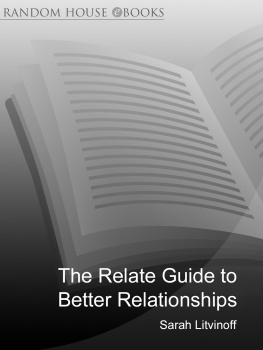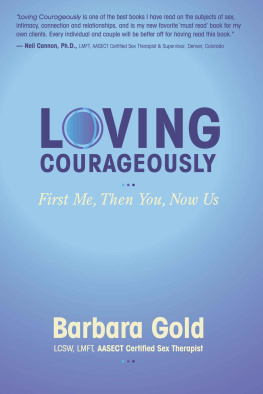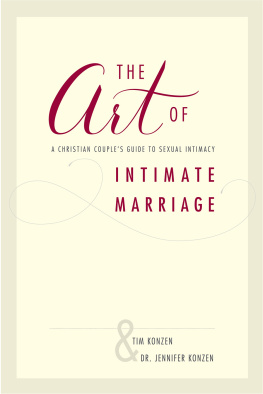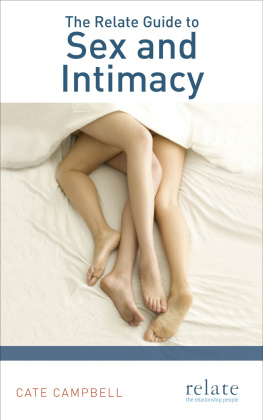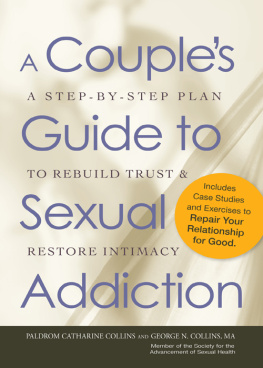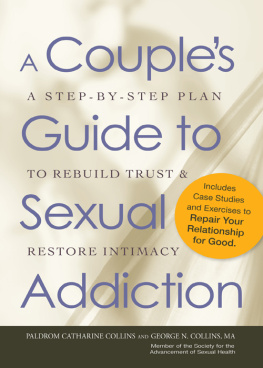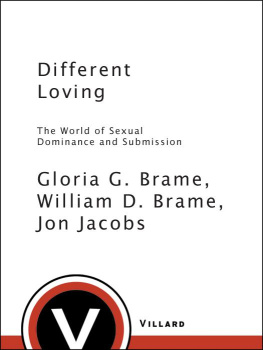This eBook is copyright material and must not be copied, reproduced, transferred, distributed, leased, licensed or publicly performed or used in any way except as specifically permitted in writing by the publishers, as allowed under the terms and conditions under which it was purchased or as strictly permitted by applicable copyright law. Any unauthorised distribution or use of this text may be a direct infringement of the author's and publisher's rights and those responsible may be liable in law accordingly.
ISBN 978-1-4070-7098-8
Version 1.0
www.randomhouse.co.uk
9 10 8
Copyright Sarah Litvinoff and Relate 1992, 1999
Sarah Litvinoff has asserted her right to be identified as the author of this work in accordance with the Copyright, Designs and Patents Act, 1988.
This electronic book is sold subject to the condition that it shall not by way of trade or otherwise, be lent, resold, hired out, or otherwise circulated without the publisher's prior consent in any form other than that in which it is published and without a similar condition including this condition being imposed on the subsequent purchaser
First published in 1992 by Vermilion
This edition published in 2001 by Vermilion
an imprint of Ebury Press, Random House
20 VauxhaU Bridge Road, London SW1V 2SA
www.randomhouse.co.uk
Random House Australia (Pty) Limited
20 Alfred Street, Milsons Point, Sydney,
New South Wales 2061, Australia
Random House New Zealand Limited
18 Poland Road, Glenfield,
Auckland 10, New Zealand
Random House South Africa (Pty) Limited
Endulini, 5A Jubilee Road,
Parktown 2192, South Africa
The Random House Group Limited Reg. No. 954009
Papers used by Vermilion are natural, recyclable products made from wood grown in sustainable forests.
ISBN: 978-1-4070-7098-8
Version 1.0
Acknowledgements
This book has been based on the sensitive, tactful and compassionate work of RELATE sex therapists and counsellors, many of whom gave their time to talk about their clients and their work. Marj Thobum, Head of RELATE Sex Therapy, was involved in the book from the beginning, and read and commented on it while it was being written, ensuring it was in line with RELATE'S approach. Alison Clegg, former Head of RELATE Sex Therapy, gave many hours to talk about sex therapy generally and specifically, and made useful suggestions on the manuscript. Zelda West-Meads, RELATE'S Press Officer, also gave her time and encouragement during the writing of the book.
The following counsellors and sex therapists helped by talking about the experiences of many clients: Kathie Burton, Carol Carsley, Paula Carter, Julia Cole, Sue Davies, Elizabeth Lawrence, Peggie Manning, Joan Melling, Norma Moore, Dennis Nash, Joan Rayson, Christina Robinson, Catherine Roblett, Rebecca Sparks, Janice Trivett, Sandra Tucker. The experiences of many other counsellors and sex therapists have also contributed, through the interviews they gave for The RELATE Guide to Better Relationships and the work in progress, The RELATE Guide to Starting Again.
Thanks also to Peter McCabe, the Director of Fund-Raising for National RELATE, and Steve Hodgson, the Publications Manager.
Case histories
All the case histories in this book are based on real people. However, all names and distinguishing details have been changed so that the couples are unrecognisable.
WHAT IS SEX THERAPY?
Sex therapy is for couples who need help in coping with a sexual problem. The sex therapists are fully trained and experienced RELATE counsellors men and women who are chosen for their ability to share people's problems sympathetically and who have had further specialized training to help couples overcome sexual difficulties.
Everything couples say is treated confidentially. Therapists realise that sexual problems are difficult to talk about and know how to put couples at their ease. They also know that couples are often unable to discuss their difficulties together and will help them do so.
The sessions with the therapist involve talking in explicit ways about sexual matters, and the therapist offering a great deal of information. During the course of therapy couples are often asked to carry out specific sexual tasks tailored to their needs. These are carried out in the privacy of their own homes, and never with the therapist present
The sessions talking to the therapist, which last about an hour, take place in private rooms at RELATE centres. The number of sessions varies, but most couples attend on average between twelve and fourteen times.
To find your nearest RELATE sex therapist, contact your local RELATE centre by looking in the telephone directory under 'RELATE' or 'Marriage Guidance'. The national office is at Herbert Gray College, little Church Street, Rugby CV2 13AP; Tel: 01788 573241.
INTRODUCTION
Sex is part of a loving relationship. At its best, when there is openness, trust and friendship as well as love, sex can be everything you ever hoped for and even better. But sex with someone you love can also be as routine and dull as brushing your teeth. It can be a cause of shame and misery. It can be painful and disturbing. Sex with someone you love can be something that you avoid at all costs.
How can doing something so intimate and potentially good with the one you love also be the cause of such disappointment, even pain? On the one hand it is the most natural thing in the world, a logical result of romantic love, the physical expression of a more symbolic union. On the other hand, just because it is natural doesn't mean that it is simple. Talking is 'natural', but there is a great difference between a four-year-old child who has the vocabulary and grammar to get by in life and an adult who is able to express complicated ideas and the subtleties of emotions. To use words is natural, but to become an articulate adult involves work, education and practice. Sex is similar. It is a basic drive, and most healthy couples will manage sexual intercourse. But sex that is good and satisfying is more than that, and it doesn't just happen. Loving someone is not enough to guarantee a happy sex life. This book tells you what else you need to know to improve your sex life.
There is probably more written and talked about sex than any other aspect of a loving relationship. In some ways this is good, but it is also part of the problem. Many people have recognised that good sex needs time and technique, and this has helped some towards a more rewarding sex life. But, along the way, this focusing on the mechanics of sex has caused a distortion that increases unhappiness.
Sex has become both separated and elevated in our time. The most obvious result of this is the complete separation of sex from love. It is no longer considered unusual for sex to come before love one of the first acts of a new relationship or as an end in itself, something you do with a stranger, like a game of tennis. The emphasis in recreational sex without love is on performance being 'good' at it, and on gratification measured in orgasms.
Perhaps because of this, sex in a loving relationship has also come to be to be viewed as separate from the rest of your lives together. But sex in a loving relationship is different. Sex in this case is also an expression of the way you feel about each other, and as such it can be much more rewarding, varied and subtle than sex with someone you scarcely know. Loving sex can be more sensual than sex without love. Discovering sensual sex brings the revelation that penetration and even orgasms are not essential to joyful and satisfying sex. But, as sex in a committed relationship reflects the way you feel about each other, about yourselves and about the state of your life, it can also have its difficult times.


